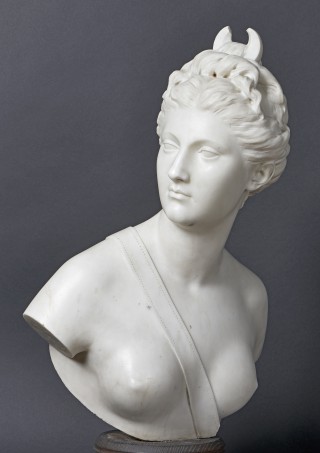Bust of Diana
- Date
- 1777; 1780
- Object type
- sculpture
- Technique
- sculpting
- Material
- marble
- Dimensions
- 68.0 x 45.0 x 37.0 cm
- Location
- The Palace on the Isle - Dining Room, ground floor
- Marks and inscriptions
- signed and dated: A. HOUDON, F. AN. 1777 and houdon, 1780.
- Place of Origin
- Paris (France)
- Owner
- The Royal Łazienki
- Acquisition name
- Deposit of The State Treasury
- Museum number
- Dep 957
Diana ‒ Roman goddess of light and guardian of all forms of life, associated with the Greek Artemis, goddess of the hunt, ruler of forests and wild animals, goddess of the moon. Similarly to her bother Apollo, the attributes of Artemis were a bow and arrows. The goddess is often depicted with the motif of a half-moon on her forehead.
The goddess’ bust is one of the few versions of the images of Diana made by Jean-Antoine Houdon at the end of the 18th c. Houdon was one of the most outstanding French sculptors at the turn of the 18th and 19th c. He sculpted mythological statues in imitation of the classical style, with well-defined contours and a cold expression. He gained fame and great popularity thanks to his realistic busts and figures portraying famous personages of the Enlightenment, including Voltaire, Molière, Denis Diderot, Jean-Jacques Rousseau, Benjamin Franklin, George Washington, Napoleon II and Catherine the Great.
The marble bust exhibited in the Palace on the Isle was, until recently, believed lost. It is a replica of a fragment of a marble statue depicting a full-length figure of Diana, which in 1784 was acquired by Catherine the Great from Ernest II, Duke of Saxe-Gotha-Altenburg (at present the property of the Fundação Calouste Gulbenkian in Lisbon). The marble sculpture dated to 1780 shows Diana the Huntress with a quiver full of arrows on a strap across her breast. The plaster cast of the full-figure statue was shown by the artist in 1777 in his atelier. At the same time Houdon also exhibited a marble bust of Diana at the Paris Salon.
The bust by Houdon was one of the most valuable works by a contemporary artist which King Stanisław August acquired for his collection, as is confirmed by the 1795 inventory compiled by the court painter Marcello Bacciarelli. At the end of the 18th c. the sculpture was part of the decoration of the Dining Room in the Palace on the Isle.
Lost in 1940, during the German occupation of Poland, along with other precious works of art, it was taken to Kraków, where it was housed in the headquarters of Hans Frank, the Governor General. In July 2015, Ewa Ziembińska of the National Museum in Warsaw discovered the sculpture at an auction of works of art in Vienna. The Ministry of Culture and National Heritage requested that the sculpture be returned to Poland. It was possible to recover the sculpture as a result of the collaboration between the Ministry of Culture and the Art Recovery Group, a London-based company specialising in the recovery of works of art. It was possible to recover the statue thanks to the assistance of Artur Lorkowski, Ambassador to the Republic of Poland in Austria and staff of the Polish Embassy in Vienna, in particular the General Consul, Andrzej Kaczorowski. [A. Czarnecka]









